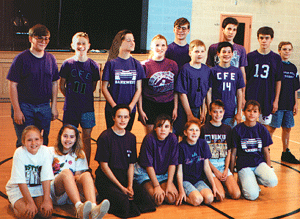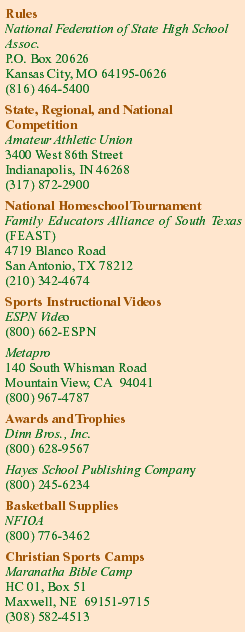 |

|
Have you ever known parents that worked and sacrificed to give their
children a home education in a wholesome environment, and then abandoned
it all so that their children could play public school sports? It’s so
unnecessary. Homeschool families can develop any sports or fellowship
our teens yearn for.

|
|
C.F.E. Team (Christian Educators) Grove, KS
|
For a look at a sports program that stresses Christian principles and
does not promote the “win-at-all-costs” attitudes so prevalent in most
public schools, let’s look at what Northwest Kansas homeschoolers have
done with their basketball program, one of many such programs in
existence around the country. In an area larger than the state of
Maryland, yet with a population of less than 90,000, three homeschool
basketball programs are currently in operation, plus two area support
groups have basketball included as part of their weekly and semi-weekly
afternoon meetings. Students and parents alike enjoy the regular
fellowship, fun, and learning opportunities. Occasional games and
tournaments with other homeschool teams in the region provide added
fellowship opportunities.
Interested in starting a homeschool basketball program? Here are some
questions to ask:
- Are enough interested students willing to commit to the proposed
program? If the numbers are low, homeschoolers from nearby areas may be
interested.
- Is there a centrally-located, no-cost or low-cost gym regularly
available at the times needed for the program?
- Is there enough help to do it right? Homeschool dads are often the
best candidates for coaching and referee positions, which usually means
an evening practice. Scorekeepers and timekeepers are also needed, along
with “sidelines sheriffs” to keep track of small children.
- How will the costs be handled? Unless a benefactor is willing to
underwrite the whole program, costs that will likely be incurred include
photocopies, postage, envelopes, long-distance calls, possible gym fees,
coaches’ whistles/ stopwatches/timers, awards, and much more.
- How often, when, and how long should each practice be? A regular
time and place is far less trouble and expense than the
practice-to-practice method of scheduling.
Based on the past experiences of several homeschool basketball programs,
here are some suggestions.
- Your first priority should be a team philosophy that stresses
Christian character and values, fellowship, friendship, good
sportsmanship, and wholesome fun. Criticism, ridicule, rough play,
self-seeking behavior, and “win-at-all-costs” attitudes should not be
allowed. The program should be conducted in a way that God would approve
of.
- Establish a homeschool student priority. Do not let friends,
public school siblings or relatives, or parents take over or crowd out
homeschool students at scrimmages. Only homeschool students should be
allowed to play in tournaments and games.
- Establish a parents’ advisory council to share responsibilities
and explore ways to minimize all costs.
- Provide the best possible instruction patiently and play by the
rules. Even if no experienced coaches are available, libraries can
provide many helpful books. ESPN Video offers two good instructional
videos, Fast Break I & II and Do It Better Basketball. Be sure to
coordinate attendance records with what is taught at each practice. This
will help those who missed practices to have a chance to pick up what
they missed. Many basketball camps are available for those serious about
improving their skills.
- Set age minimums. Most children under 10 have trouble with
basketball programs because the baskets are too high, older teammates
are too big (and hazardous as a result), attention spans are too short,
and they have trouble grasping the concepts being taught.
- Separate teams for boys and girls. While this may not be popular
with some, many parents have found that generally boys play a more
aggressive game than girls. Parents whose daughters were involved in
co-ed basketball were not only concerned for their daughters’ safety,
but that they might adopt a more masculine, aggressive attitude. Parents
whose sons were involved in co-ed basketball found that one of two
things generally happened. First, because of much incidental contact in
basketball, contact was being made in ways that were contrary to the
ways the parents were teaching their sons to treat young ladies. Second,
some boys could not play an effective game for fear of improper contact.

- Pick a team name and a team color. Let the students make the
selections, along with their own personal numbers. It is amazing the
effect this has on a sense of team unity.
- Locate the necessary equipment. A team will need a few
basketballs, an air pump, score sheets, whistles, stopwatches or timers,
and some sort of scoreboard (even a chalkboard will work). Black and
white T-shirts are very helpful for identifying the teams in scrimmages.
Many of these things can be donated.
- Select a no-cost or low-cost gym. Many possibilities exist,
including church gyms, armories, private school gyms, community gyms,
some public school gyms, gyms closed due to school district
consolidations, YMCA or other club gyms, and outdoor courts. Twice as
many kids can be kept playing if you play half-court.
- Try to schedule a few games or tournaments. The best prospects
are other homeschool teams. Other possibilities include private schools,
church youth groups, or AAU competition. For students serious about
developing skills, the growing number of local 3-on-3 tournaments offer
excellent opportunities. Homeschool students need to be reminded to be
careful not to adopt some of the wrong attitudes they will encounter
occasionally. Awards are a great way to cap off a homeschool game or
tournament. Inexpensive basketball awards are available from the Hayes
School Publishing Company and from Dinn Brothers, Inc.
See the table of resources. Have fun, and see you on the court!
Tom Scheimo is a homeschool dad who works part-time at the Post Office
in the mornings. In the afternoons, he teaches his two children all
their classes. He also serves as the volunteer coordinator for the
Christian Family Educators’ two teams located in Colby and Norton,
Kansas.
|
 |
 |